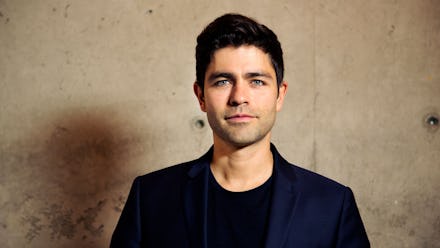Adrian Grenier wants you to put down your plastic straws to defend our oceans

I want as many people as possible to #StopSucking — and though it won’t be possible for everybody, for most people it won’t be hard.
Let me explain.
In the U.S. alone, we use around 500 million plastic straws per day. A plastic straw is used, on average, for just 20 minutes. The problem is that plastic is not biodegradable, nor often properly recycled. And much of it — like plastic straws — eventually ends up in our oceans.
Currently, there is an estimated between 4 and 12 million tons of plastic waste in our oceans every year. Most of it is single-use, meaning it’s used only once before it’s thrown away — like plastic straws, which are one of the top 10 types of trash pulled from our oceans. All that trash remains in our environment, destroying our oceans, killing aquatic life and ending up in the food we eat. This is unacceptable and unsustainable human behavior.
This issue has not gone unnoticed by our governments and world leaders. For instance, in April I helped the United Nations Environment Programme launch its Clean Seas campaign, the goal of which is to stop plastic pollution before it ever reaches the sea. To build upon the campaign’s goal, the Lonely Whale Foundation launched the Strawless Ocean program, a collaborative global initiative to permanently remove a minimum of 500 million plastic straws from our waste stream in the U.S. (Today, this initiative is supported by over 50 leading nongovernmental organizations and creative partners.)
There’s a reason that we are not advocating for the complete elimination of single-use plastic straws worldwide: Many people with disabilities may need to use a straw and often only a plastic or biodegradable plastic straw will suffice, and it’s important to build an environmental movement that not only protects our oceans but also recognizes, respects and includes the voices of our community members with disabilities. But just because we know that a limited number of straws need to remain available, it doesn’t mean that those of us who don’t need to use them should make use of that availability.
As individuals, we can only do so much to protect our oceans, but together we can make a wave of change. This is why Lonely Whale wants you to #StopSucking on plastic straws. And as part of the anti-waste initiative, Defend Our Future, a grassroots campaign empowering young people to take action to protect the environment for future generations, is asking folks to contact their elected representatives to tell these officials that they need to support efforts to protect our ocean, our air and our climate.
Take just one small action in your daily life: Find a partner and hold one another accountable, and challenge others to follow your leadership. Tell your server to hold the straw next time you order something to drink. (While you’re at it, politely challenge them to #StopSucking if they can go without a straw, too!) Call your member of Congress and let them know why it’s important for them to support legislation that protects the future of our oceans. Start small, act often, and together we can help keep plastic out of our ocean.
Our ocean gives us life: It holds more than 97% of the world’s water, produces more than 70% of the world’s oxygen and is a major source of food for over 1 billion people. But our ocean is facing an incredible challenge, given the volume of plastic waste we release into it; a challenge which we, humans, are alone responsible for. It’s long past time to take responsibility for our actions and #StopSucking.
Adrian Grenier is an actor, filmmaker, Dell Social Good Advocate and a newly appointed UN Environment Goodwill Ambassador. He is a passionate environmentalist who actively supports organizations focused on habit-changing education including the Lonely Whale Foundation, which he co-founded in December 2015.